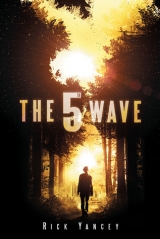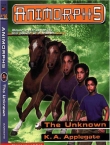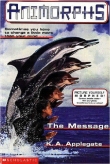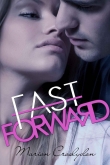
Текст книги "The 5th Wave"
Автор книги: Rick Yancey
Жанры:
Подростковая литература
,сообщить о нарушении
Текущая страница: 26 (всего у книги 27 страниц)


“WELL?” I SAY after several minutes pass and Ben doesn’t come down—the slow way or the fast way.
“Just…enough…room. I think.” His voice sounds tiny. “It goes back pretty far. But I can see light up ahead.”
“Light?”
“Bright light. Like floodlights. And…”
“And? And what?”
“And it’s not very stable. I can feel it slipping underneath me.”
I squat down in front of Sammy, tell him to climb aboard, and wrap his arms around my neck.
“Hold on tight, Sam.” He puts me in a choke hold. “Ahhh,” I gasp. “Not that tight.”
“Don’t let me fall, Cassie,” he whispers into my ear as I start up.
“I won’t let you fall, Sam.”
He presses his face against my back, completely trusting I won’t let him fall. He’s been through four alien attacks, suffered God knows what in Vosch’s death factory, and my brother still trusts that somehow everything will be okay.
There really is no hope, you know, Vosch said. I’ve heard those words before, in another voice, my voice, in the tent in the woods, under the car on the highway. Hopeless. Useless. Pointless.
What Vosch spoke, I believed.
In the safe room I saw an infinite sea of upturned faces. If they had asked, would I have told them there was no hope, that it was pointless? Or would I have told them, Climb onto my shoulders, I will not let you fall?
Reach. Grab. Pull. Step. Rest.
Reach. Grab. Pull. Step. Rest.
Climb onto my shoulders. I will not let you fall.


BEN GRABS MY WRISTS when I near the top of the debris, but I gasp for him to pull Sammy up first. I’ve got nothing left for that final foot. I just hang there, waiting for Ben to grab me again. He heaves me into the narrow gap, a sliver of space between the ceiling and the top of the slide. The darkness up here is not as dense, and I can see his gaunt face dusted in concrete, bleeding from fresh scratches.
“Straight ahead,” he whispers. “Maybe a hundred feet.” No room to stand or sit up: We’re lying on our stomachs nearly nose to nose. “Cassie, there’s…nothing. The entire camp’s gone. Just…gone.”
I nod. I’ve seen what the Eyes can do up close and personal. “Have to rest,” I pant, and for some reason I’m worried about the quality of my breath. When was the last time I brushed my teeth? “Sams, you okay?”
“Yes.”
“Are you?” Ben asks.
“Define okay.”
“That’s a definition that keeps changing,” he says. “They’ve lit the place up out there.”
“The plane?”
“It’s there. Big, one of those huge cargo planes.”
“There’s a lot of kids.”
We crawl toward the bar of light seeping through the crack between the ruins and the surface. It’s hard going. Sammy starts to whimper. His hands are scraped raw, his body bruised from the rough stone. We squeeze through spots so narrow, our backs scrape against the ceiling. Once I get stuck and it takes Ben several minutes to work me free. The light pushes back the dark, grows bright, so bright I can see individual particles of dust spinning against the inky backdrop.
“I’m thirsty,” Sammy whines.
“Almost there,” I assure him. “See the light?”
At the opening I can see across Death Valley East, the same barren landscape of Camp Ashpit times ten, thanks to the floodlights swinging from hastily erected poles anchored in the shafts that funneled air into the complex below.
And above us, the night sky peppered with drones. Hundreds of them, hovering a thousand feet up, motionless, their gray underbellies glimmering in the light. On the ground below them, and far to my right, an enormous plane sits perpendicular to our position: When it takes off, it’ll pass right by us.
“Have they loaded the—” I start. Ben cuts me off with a hiss.
“They’ve started the engines.”
“Which way is north?”
“About two o’clock.” He points. His face has no color. None. His mouth hangs open a little, like a dog panting. When he leans forward to look at the plane, I can see his entire shirtfront is wet.
“Can you run?” I ask.
“I have to. So, yes.”
I turn to Sam. “Once we get out in the open, climb back on, okay?”
“I can run, Cassie,” Sammy protests. “I’m fast.”
“I’ll carry him,” Ben offers.
“Don’t be ridiculous,” I say.
“I’m not as weak as I look.” He must be thinking about Vosch.
“Of course not,” I say back. “But if you go down with him, we’re all dead.”
“Same with you.”
“He’s my brother. I’m carrying him. Besides, you’re hurt and—”
That’s all I get out. The rest is buried under the roar of the huge plane coming toward us, picking up speed.
“This is it!” Ben shouts, but I can’t hear him. I have to read his lips.


WE CROUCH AT THE OPENING, tips of our fingers, balls of our feet. The cold air vibrates in sympathy for the deafening thunder of the big plane screaming over the hard-packed ground. It’s even with us when the front wheel rises, and that’s when the first blast hits.
And I think, Um, a little early there, Evan.
The ground heaves and we take off, Sammy bouncing up and down on my back, and behind us the stairwell seems to collapse soundlessly, because all sound is buried beneath the roar of the plane. The blowback of the engines slams against my left side, and I stumble sideways and nearly slip. Ben catches me and hurls me forward.
Then I go airborne. The earth bulges like a balloon inflating and then snaps back, the ground splitting apart with such force, I’m afraid my eardrums have shattered. Luckily for Sam, I land on my chest, but that’s unlucky for me, because the impact knocks every cubic inch of breath out of my lungs. I feel Sammy’s weight disappear and see Ben sling him over his shoulder, and then I’m up but falling behind and thinking, Like hell weak, like hell.
Before us the ground seems to stretch to infinity. Behind us, it’s being sucked into a black hole, and the hole chases us as it expands, devouring everything in its path. One slip and we’ll be sucked in, our bodies ground into microscopic pieces.
I hear a high-pitched screaming from above, and a drone slams into the earth a dozen yards away. The impact blows it apart, turns it into a grenade the size of a Prius, and a thousand pieces of razor-sharp shrapnel from the blast shred my khaki T-shirt and tear into my exposed skin.
There’s a rhythm to this rain of drones. First the banshee scream. Then the explosion when they meet the rock-hard ground. Then the blast of debris. And we dodge between these raindrops of death, zigzagging across the lifeless landscape as that landscape is consumed by the hungry black hole chasing us.
I have another problem, too. My knee. The old injury where a Silencer in the woods cut me down. Every time my foot strikes the hard ground, a stabbing pain shoots down my leg, throwing off my stride, slowing me down. I’m falling farther and farther behind, and that’s what it feels like, not running so much as falling forward while someone smashes a sledgehammer against my knee, over and over.
A scar appears in the perfect nothingness ahead. Grows larger. It’s coming on fast, barreling straight toward us.
“Ben!” I yell, but he can’t hear me over the screaming and booms and the ear-shattering implosion of two hundred tons of rock collapsing into the vacuum created by the Eyes.
The fuzzy shadow coming toward us hardens into a shape, and then the shape becomes a Humvee, bristling with gun turrets, bearing down.
Determined little bastards.
Ben sees it now but we have no choice, we can’t stop, we can’t turn back. At least it will suck them down, too, I think.
And then I fall.
I’m not sure why. I don’t remember the fall itself. One minute I’m up, the next my face is against hard stone and I’m like, Where did this wall come from? Maybe my knee locked up. Maybe I slipped. But I’m down and I feel the earth beneath me crying and screaming as the hole tears it apart, like a living creature being eaten alive by a hungry predator.
I try to push myself up, but the ground is not cooperating. It buckles beneath me, and I fall again. There’s Ben and Sam several yards ahead, still on their feet, and there’s the Humvee, cutting in front of them at the last second, burning rubber. It barely slows down. The door flies open and a skinny kid leans out, his hand reaching for Ben.
Ben hurls Sammy toward the kid, who hauls my brother inside and then bangs his hand hard against the side of the vehicle like he’s saying, Let’s go, Parish, let’s go!
And then, instead of jumping onto the Humvee like a normal person, Ben Parish turns and races back for me.
I wave him back. No time, no time, no time no time no time no time.
I can feel the breath of the beast on my bare legs—hot, dusty, pulverized stone and dirt—and then the ground splits open between Ben and me as the chunk I’m lying on breaks free and starts to slide into its lightless mouth.
Which makes me start to slide backward, away from Ben, who’s wisely thrown himself on his stomach at the edge of the fissure to avoid riding the chunk with me straight into the black hole. Our fingertips touch, flirt with one another, his pinky hooks around mine—Save me, Parish, pinky swear, okay?—but he can’t pull me up by my pinky, so in the half second he has to decide, he decides, flicks my finger free, and takes his one and only shot to grab my wrist.
I see his mouth open but hear nothing come out as he throws himself backward, hauling me up and over, and he doesn’t let go, he hangs on to my wrist with both hands and spins around like a shot-putter, launching me toward the Humvee. I think my feet actually leave the ground.
Another hand catches my arm and pulls me inside. I end up straddling the skinny guy’s legs, only now up close I see it isn’t a guy but a dark-eyed girl with shiny, straight black hair. Over her shoulder I see Ben leap for the back of the Humvee, but I can’t see if he makes it. Then I’m slammed against the door as the driver whips the wheel hard to the left to avoid a falling drone. He floors the gas.
The hole has gobbled up all the lights by this point, but it’s a clear night and I have no trouble watching the edge of the pit rocketing toward the Humvee, the mouth of the beast opening wide. The driver, who is way too young to have even a permit, whips the wheel back and forth to avoid the torrent of drones exploding all around us. One hits a car length in front of us, no time to swerve around it, so we barrel through the blast. The windshield disintegrates, showering us with glass.
The back wheels slip, we jounce, then leap forward, inches ahead of the hole now. I can’t look at it anymore, so I look up.
Where the mothership sails serenely across the sky.
And beneath it, dropping fast toward the horizon, another drone.
No, not a drone, I think. It’s glowing.
A falling star, it must be, its fiery tail like a silver cord connecting it to the heavens.


BY THE TIME dawn approaches, we’re miles away, hunkering beneath a highway overpass, where the kid with the very big ears they call Dumbo kneels beside Ben, applying a fresh dressing to the wound in his side. He’s already worked on me and Sammy, pulling out pieces of shrapnel, swabbing, stitching, bandaging.
He asked what happened to my leg. I told him I was shot by a shark. He doesn’t react. Doesn’t seem confused or amused or anything. Like getting shot by a shark is a perfectly natural thing in the aftermath of the Arrival. Like changing your name to Dumbo. When I asked him what his real name was, he said it was…Dumbo.
Ben is Zombie, Sammy is Nugget, Dumbo is Dumbo. Then there’s Poundcake, a sweet-faced kid who doesn’t talk, whether he can’t or won’t, I don’t know. Teacup, a little girl not much older than Sams, who might be seriously messed up, and that worries me, because she holds and strokes and cuddles with an M16 that appears to be carrying a full clip.
Finally the pretty dark-haired girl called Ringer, who’s about my age, who not only has very shiny and very straight black hair, but also has the flawless complexion of an airbrushed model, the kind you see on the covers of fashion magazines smiling arrogantly at you in the checkout line. Except Ringer never smiles, like Poundcake never talks. So I’ve decided to cling to the possibility that she’s missing some teeth.
There’s also something between her and Ben. Something as in they appear to be tight. They spent a long time talking when we first got here. Not that I was spying on them or anything, but I was close enough to overhear the words chess, circle, and smile.
Then I heard Ben ask, “Where’d you get the Humvee?”
“Got lucky,” she said. “They moved a bunch of equipment and supplies to a staging area about two klicks due west of the camp, I guess in anticipation of the bombing. Guarded, but Poundcake and I had the advantage.”
“You shouldn’t have come back, Ringer.”
“If I hadn’t, we wouldn’t be talking right now.”
“That’s not what I mean. Once you saw the camp blow, you should have fallen back to Dayton. We might be the only ones who know the truth about the 5th Wave. This is bigger than me.”
“You went back for Nugget.”
“That’s different.”
“Zombie, you’re not that stupid.” Like Ben is only a little bit stupid. “Don’t you get it yet? The minute we decide that one person doesn’t matter anymore, they’ve won.”
I have to agree with Li’l Miss Microscopic Pores on that point. While I hold my little brother in my lap to keep him warm. On the rise of ground that overlooks the abandoned highway. Beneath a sky crowded with a billion stars. I don’t care what the stars say about how small we are. One, even the smallest, weakest, most insignificant one, matters.
It’s almost dawn. You can feel it coming. The world holds its breath, because there’s really no guarantee that the sun will rise. That there was a yesterday doesn’t mean there will be a tomorrow.
What did Evan say?
We’re here, and then we’re gone, and it’s not about the time we’re here, but what we do with the time.
And I whisper, “Mayfly.” His name for me.
He had been in me. He had been in me and I had been in him, together in an infinite space, and there had been no spot where he ended and I began.
Sammy stirs in my lap. He dozed off; now he’s awake again. “Cassie, why are you crying?”
“I’m not. Shush and go back to sleep.”
He brushes his knuckles across my cheek. “You are crying.”
Someone is coming toward us. It’s Ben. I hurriedly wipe the tears away. He sits beside me, very carefully, with a soft grunt of pain. We don’t look at each other. We watch the fiery hiccups of the fallen drones in the distance. We listen to the lonely wind whistling through dry tree branches. We feel the coldness of the frozen ground seeping up through the soles of our shoes.
“I wanted to thank you,” he says.
“For what?” I ask.
“You saved my life.”
I shrug. “You picked me up when I fell,” I say. “So we’re even.”
My face is covered in bandages, my hair looks like a bird nested in it, I’m dressed up like one of Sammy’s toy soldiers, and Ben Parish leans over and kisses me anyway. A light little peck, half cheek, half mouth.
“What’s that for?” I ask, my voice coming out in a tiny squeak, the little girl’s from long ago, the freckle-faced Cassie-I-was with the fuzzy hair and knobby knees, an ordinary girl who shared an ordinary yellow school bus with him for an ordinary day.
In all my fantasies about our first kiss—and there’d been about six hundred thousand of them—I never once imagined it would be like that one. Our dream kiss usually involved moonlight, or fog, or moonlight and fog, a very mysterious and romantic combination, at least in the right locale. Moonlit fog beside a lake or a lazy river: romantic. Moonlit fog in almost any other place, like a narrow alleyway: Jack the Ripper.
Do you remember the babies? I asked in my fantasies. And Ben always goes, Oh yes. Sure I do. The babies!
“Hey, Ben, I was wondering if you remember…We rode the bus together in middle school, and you were talking about your little sister, and I told you Sammy was just born, too, and I was wondering if you remembered that. About them being born together. Not together, that would make them twins, ha-ha—I mean at the same time. Not the exact same time, but about a week apart. Sammy and your sister. The babies.”
“I’m sorry…Babies?”
“Never mind. It’s not important.”
“Nothing is not important anymore.”
I’m shaking. He must notice, because he puts his arm around me and we sit like that for a while, my arms around Sammy, Ben’s arm around me, and together the three of us watch the sun break over the horizon, obliterating the dark in a burst of golden light.


Writing a novel may be a solitary experience, but seeing it to a finished book is not, and I would be a total schmuck to claim all credit for myself. I owe an enormous debt to the team at Putnam for their immeasurable enthusiasm that only seemed to intensify as the project grew past all our expectations. Huge thanks to Don Weisberg, Jennifer Besser, Shanta Newlin, David Briggs, Jennifer Loja, Paula Sadler, and Sarah Hughes.
There were times when I was convinced that my editor, the unconquerable Arianne Lewin, was channeling some demonic spirit bent on my creative destruction, testing my endurance, pushing me, as all great editors do, to the shadowy boundaries of my ability. Through multiple drafts, endless revisions, and countless changes, Ari never wavered in her belief in the manuscript—and in me.
My agent, Brian DeFiore, should be awarded a medal (or at least a fancy certificate tastefully framed) as manager extraordinaire of my writer’s angst. Brian is that rarest breed of agent who never hesitates to wander into the deepest thickets with his client, always willing—I won’t say always eager—to lend an ear, hold a hand, and read the four hundred and seventy-ninth version of an ever-changing manuscript. He would never say he’s the best, but I will: Brian, you’re the best.
Thanks to Adam Schear for his expert handling of the foreign rights to the novel, and a special thank-you to Matthew Snyder at CAA for navigating that strange and wonderful and baffling world of film, working his mystical powers with awe-inspiring efficiency—before the book was even finished. I wish that I were half the writer that he is an agent.
A writer’s family bears a particular burden during the composition of a book. I honestly don’t know how they took it sometimes, the long nights, the moody silences, the blank stares, the distracted answers to questions they never really asked. To my son, Jake, I owe hearty thanks for providing his old man with a teen’s perspective and particularly for the word “boss” when I needed it most.
There is no one to whom I am more indebted than my wife, Sandy. It was a late-night conversation filled with the same exhilarating mixture of hilarity and fear so characteristic of many of our late-night conversations that was the genesis of this book. That and a very odd debate a few months later comparing an alien invasion to a mummy attack. She is my fearless guide, my finest critic, my most rabid fan, and my fiercest defender. She is also my best friend.
I lost a dear friend and companion during the writing of this book, my faithful writing dog, Casey, who braved every assault, stormed every beach, and fought for every inch of ground by my side. I will miss you, Case.


ONE
“A Singular Curiosity”
These are the secrets I have kept. This is the trust I never betrayed.
But he is dead now and has been for more than forty years, the one who gave me his trust, the one for whom I kept these secrets.
The one who saved me…and the one who cursed me.
I can’t recall what I had for breakfast this morning, but I remember with nightmarish clarity that spring night in 1888 when he roused me roughly from my slumber, his hair unkempt, eyes wide and shining in the lamplight, the excited glow upon his finely chiseled features, one with which I had, unfortunately, become intimately acquainted.
“Get up! Get up, Will Henry, and be quick about it!” he said urgently. “We have a caller!”
“A caller?” I murmured in reply. “What time is it?”
“A little after one. Now get dressed and meet me at the back door. Step lively, Will Henry, and snap to!”
He withdrew from my little alcove, taking the light with him. I dressed in the dark and scampered down the ladder in my stocking feet, putting on the last of my garments, a soft felt hat a size too small for my twelve-year-old head. That little hat was all I had left from my life before coming to live with him, and so it was precious to me.
He had lit the jets along the hall of the upper floor, though but a single light burned on the main floor, in the kitchen at the rear of the old house where just the two of us lived, without so much as a maid to pick up after us: The doctor was a private man, engaged in a dark and dangerous business, and could ill afford the prying eyes and gossiping tongue of the servant class. When the dust and dirt became intolerable, about every three months or so, he would press a rag and a bucket into my hands and tell me to “snap to” before the tide of filth overwhelmed us.
I followed the light into the kitchen, my shoes completely forgotten in my trepidation. This was not the first nocturnal visitor since my coming to live with him the year before. The doctor had numerous visits in the wee hours of the morning, more than I cared to remember, and none were cheerful social calls. His business was dangerous and dark, as I have said, and so, on the whole, were his callers.
The one who called on this night was standing just outside the back door, a gangly, skeletal figure, his shadow rising wraithlike from the glistening cobblestones. His face was hidden beneath the broad brim of his straw hat, but I could see his gnarled knuckles protruding from his frayed sleeves, and knobby yellow ankles the size of apples below his tattered trousers. Behind the old man a broken-down nag of a horse stamped and snorted, steam rising from its quivering flanks. Behind the horse, barely visible in the mist, was the cart with its grotesque cargo, wrapped in several layers of burlap.
The doctor was speaking quietly to the old man as I came to the door, a comforting hand upon his shoulder, for clearly our caller was nearly mad with panic. He had done the right thing, the doctor was assuring him. He, the doctor, would take the matter from here. All would be well. The poor old soul nodded his large head, which appeared all the larger with its lid of straw as it bobbed on its spindly neck.
“’Tis a crime. A bloody crime of nature!” he exclaimed at one point. “I shouldn’t have taken it; I should have covered it back up and left it to the mercy of God!”
“I take no stances on theology, Erasmus,” said the doctor. “I am a scientist. But is it not said that we are his instruments? If that is the case, then God brought you to her and directed you hence to my door.”
“So you won’t report me?” the old man asked, with a sideways glance toward the doctor.
“Your secret will be as safe with me as I hope mine will be with you. Ah, here is Will Henry. Will Henry, where are your shoes? No, no,” he said as I turned to fetch them. “I need you to ready the laboratory.”
“Yes, doctor,” I responded dutifully, and turned to go a second time.
“And put a pot on. It’s going to be a long night.”
“Yes, sir,” I said. I turned a third time.
“And find my boots, Will Henry.”
“Of course, sir.”
I hesitated, waiting for a fourth command. The old man called Erasmus was staring at me.
“Well, what are you waiting for?” the doctor said. “Snap to, Will Henry!”
“Yes, sir,” I said. “Right away, sir!”
I left them in the alley, hearing the old man ask as I hurried across the kitchen, “He is your boy?”
“He is my assistant,” came the doctor’s reply.
I set the water on to boil and then went down to the basement. I lit the lamps, laid out the instruments. (I wasn’t sure which he might need, but had a strong suspicion the old man’s delivery was not alive—I had heard no sounds coming from the old cart, and there didn’t seem to be great urgency to fetch the cargo inside…though this may have been more hope than suspicion.) Then I removed a fresh smock from the closet and rummaged under the stairs for the doctor’s rubber boots. They weren’t there, and for a moment I stood by the examination table in mute panic. I had washed them the week before and was certain I had placed them under the stairs. Where were the doctor’s boots? From the kitchen came the clumping of the men’s tread across the wooden floor. He was coming, and I had lost his boots!
I spied the boots just as the doctor and Erasmus began to descend the stairs. They were beneath the worktable, where I had placed them. Why had I put them there? I set them by the stool and waited, my heart pounding, my breath coming in short, ragged gasps. The basement was very cold, at least ten degrees colder than the rest of the house, and stayed that way year round.
The load, still wrapped tightly in burlap, must have been heavy: The muscles in the men’s necks bulged with the effort, and their descent was painfully slow. Once the old man cried for a halt. They paused five steps from the bottom, and I could see the doctor was annoyed at this delay. He was anxious to unveil his new prize.
They eventually heaved their burden onto the examining table. The doctor guided the old man to the stool. Erasmus sank down upon it, removed his straw hat, and wiped his crinkled brow with a filthy rag. He was shaking badly. In the light I could see that nearly all of him was filthy, from his mud-encrusted shoes to his broken fingernails to the fine lines and crevasses of his ancient face. I could smell the rich, loamy aroma of damp earth rising from him.
“A crime,” he murmured. “A crime!”
“Yes, grave-robbing is a crime,” said the doctor. “A very serious crime, Erasmus. A thousand-dollar fine and five years’ hard labor.” He shrugged into his smock and motioned for his boots. He leaned against the banister to tug them on. “We are coconspirators now. I must trust you, and you in turn must trust me. Will Henry, where is my tea?”
I raced up the stairs. Below, the old man was saying, “I have a family to feed. My wife, she’s very ill; she needs medicine. I can’t find work, and what use is gold and jewels to the dead?”
They had left the back door ajar. I swung it closed and threw the bolt, but not until I checked the alley. I saw nothing but the fog, which had grown thicker, and the horse, its face dominated by its large eyes that seemed to implore me for help.
I could hear the rise and fall of the voices in the basement as I prepared the tea, Erasmus’s with its high-pitched, semi-hysterical edge, the doctor’s measured and low, beneath which lurked an impatient curtness no doubt born of his eagerness to unwrap the old man’s unholy bundle. My unshod feet had grown quite cold, but I tried my best to ignore the discomfort. I dressed the tray with sugar and cream and two cups. Though the doctor hadn’t ordered the second, I thought the old man might need a cup to repair his shattered nerves.
“…halfway to it, the ground just gave beneath me,” the old grave-robber was saying as I descended with the tray. “As if I struck a hollow or pocket in the earth. I fell face-first upon the top of the casket. Don’t know if my fall cracked the lid or if it was cracked by the…cracked before I fell.”
“Before, no doubt,” said the doctor.
They were as I had left them, the doctor leaning against the banister, the old man shivering upon the stool. I offered him some tea, and he accepted the proffered cup gladly.
“Oh, I am chilled to my very bones!” he whimpered.
“This has been a cold spring,” the doctor observed. He struck me as at once bored and agitated.
“I couldn’t just leave it there,” the old man explained. “Cover it up again and leave it? No, no. I’ve more respect than that. I fear God. I fear the judgment of eternity! A crime, Doctor. An abomination! So once I gathered my wits, I used the horse and a bit of rope to haul them from the hole, wrapped them up…brought them here.”
“You did the right thing, Erasmus.”
“‘There’s but one man who’ll know what to do,’ I said to myself. Forgive me, but you must know what they say about you and the curious goings-on in this house. Only the deaf would not know about Pellinore Warthrop and the house on Harrington Lane!”
“Then I am fortunate,” said the doctor dryly, “that you are not deaf.”
He went to the old man’s side and placed both hands on his shoulders.
“You have my confidence, Erasmus Gray. As I’m certain I have yours. I will speak to no one of your involvement in this ‘crime,’ as you call it, as I’m sure you will keep mum regarding mine. Now, for your trouble…”
He produced a wad of bills from his pocket and stuffed them into the old man’s hands. “I don’t mean to rush you off, but each moment you stay endangers both you and my work, both of which matter a great deal to me, though one perhaps a bit more than the other,” he added with a tight smile. He turned to me. “Will Henry, show our caller to the door.” Then he turned back to Erasmus Gray. “You have done an invaluable service to the advancement of science, sir.”
The old man seemed more interested in the advancement of his fortunes, for he was staring openmouthed at the cash in his still-quivering hands. Dr. Warthrop urged him to his feet and toward the stairs, instructing me not to forget to lock the back door and find my shoes.
“And don’t lollygag, Will Henry. We’ve work to last us the rest of the night. Snap to!”
Old Erasmus hesitated at the back door, a dirty paw upon my shoulder, the other clutching his tattered straw hat, his rheumy eyes straining against the fog, which had now completely engulfed his horse and cart. Its snorts and stamping against the stones were the only evidence of the beast’s existence.
“Why are you here, boy?” he asked suddenly, giving my shoulder a hard squeeze. “This is no business for children.”
“My parents died in a fire, sir,” I answered. “The doctor took me in.”
“The doctor,” Erasmus echoed. “They call him that—but what exactly is he a doctor of?”
The grotesque, I might have answered. The bizarre. The unspeakable. Instead I gave the same answer the doctor had given me when I’d asked him not long after my arrival at the house on Harrington Lane. “Philosophy,” I said with little conviction.








